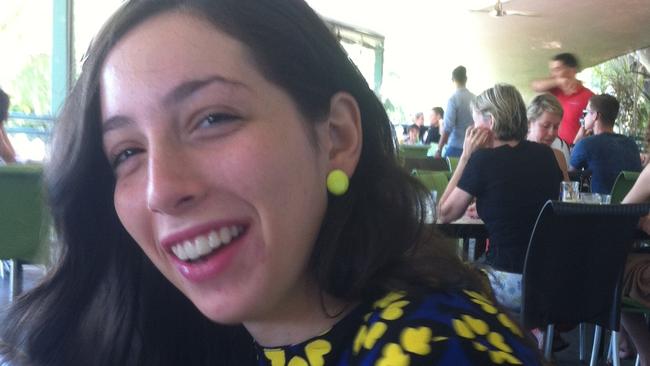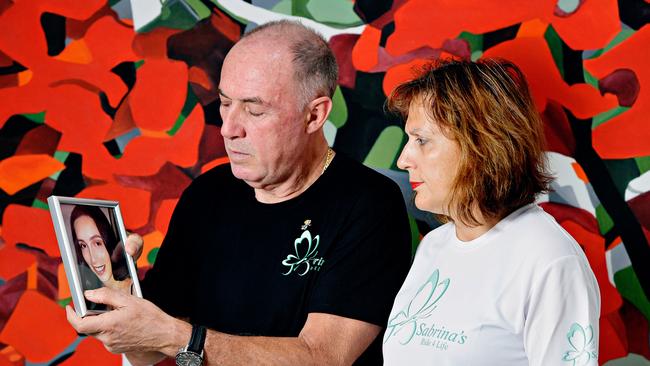THERE is a house in Darwin where a talented teen named Sabrina would play the piano, where she would study diligently, laugh loudly and talk to her loving parents for hours on end.
There is a house in Darwin where a talented teen named Sabrina, 12 months ago next week, ended her own life.
It has been a year of untold grief for Michael and Lidia Di Lembo, who, despite exerting a brave public presence, remain utterly astounded as to how the mental health of their beloved daughter, a prodigious and popular law student, descended so rapidly.
“You don’t want to believe that it’s happened,” Mrs Di Lembo says.
“When you’re a family unit — as we were for a very long time — part of you is gone.”
She sits down on a large leather couch in her living room and sighs.
In the corner to her left, Sabrina can be seen in a collection of photos.
She was barely 19 when she died on August 7. It was Darwin Cup Day — a must-do social outing for the city’s young.
On Monday, scores of 18, 19 and 20-year-old locals will flock to Darwin Turf Club for this year’s glitzy event.
“She was going to go to the races,” recalls Mrs Di Lembo.
“Once the medication stopped, she did actually appear to be turning a corner. And we were so elated.”
But after a hellish two-and-a-half months, during which they’d supported their youngest child through a frightening succession of GPs, psychologists and antidepressant prescriptions, their world was flipped on its head.
Now, Mr and Mrs Di Lembo feel completely let down by the mental health system.
“She was highly anxious over exams. She could not study … couldn’t remember what she was reading,” Mrs Di Lembo says.
“I thought maybe it was just a phase and she’d come out of it. But it wasn’t happening, so I rang the (mental health) helpline …”
The weeks that followed became one frustrating phone call and appointment after another, underlined by what the aggrieved parents say was conflicting medical advice, which ultimately proved futile in allaying their daughter’s internal suffering.
“It was total confusion, as far as I’m concerned, around mental health,” Mr Di Lembo says.
The couple hope a three-day coronial inquest scheduled for October will help shed light on the systemic failures that they believe contributed to Sabrina’s suicide.
“While the inquest is something we were approached about and have agreed to, we in our interviews have advocated for change and (believe) that what happened to us when contacting the services was not, in our view, best practice,” Mrs Di Lembo says. “The coronial inquest will be about addressing any systemic gaps in services and to make people accountable for their actions, if found to be negligent.
“My daughter had to get to the point … to take her life. The duty of care here was not up to scratch.”
The days have not gotten easier, she says, but they are determined to find a silver lining in this tragic mess.
They created Sabrina’s Ride 4 Life and recently completed an incredible 3000km bicycle journey from Adelaide to Darwin, arriving home to a rousing reception at the Mindil Beach Markets.
Proceeds are being put towards national mental health charity the Black Dog Institute.
“Who would have thought Michael Di Lembo, 62 years old and hasn’t been on a bike for 40 years, would ride from Adelaide to Darwin?” Mr Di Lembo laughs.
“Everyone thought I was bloody crazy.”
But behind his self-deprecating banter is the heart-wrenching truth that Sabrina’s death was far from an isolated incident in the infamously isolated Northern Territory.
■ ■ ■
THE Territory’s suicide rate of 19.0 per 100,000 people was, according to the Australian Bureau of Statistics (ABS), the highest in the country from 2012-2016.
The problem is particularly bleak among Aboriginal communities, where exasperated locals have lived through mental health crises for decades.
Of great concern is the lack of specialist services in the NT.
According to healthkit.com, the Darwin region is serviced by only three psychiatrists, one of whom operates online.
One Darwin local, who does not wish to be named, suffers from obsessive compulsive disorder (OCD) — a chronic condition that, at its worst, can be completely debilitating.
Despite OCD affecting more than 500,000 Australians, according to sane.org, the sufferer could not find adequate treatment locally, instead forking out for effective but expensive online counselling with an interstate expert.
“There are very good specialists in the public sector in Darwin,” says Dr Rob Parker, NT branch president of the Australian Medical Association (AMA).
“However, there is a lot of pressure on existing public services that makes it hard to access them.
“There are only a very limited number of private psychiatrists in Darwin.
“There is not the population base for increased specialties.”
He says Top End Mental Health Services (TEMHS), along with the NT Primary Health Network, are developing ways for GPs to be “more aware of standardised mental health treatments”.
At Charles Darwin University (CDU), where Sabrina Di Lembo was in her second year of study, a brighter light has been shined on students’ mental wellbeing.
“The tragic loss of our bright young law student is still a very sensitive issue among CDU law students and the wider student population,” a CDU spokesman said.
“The Law Student Society has been active in generating a student-led approach to ensuring their peers have a better understanding of stress and its manifestations.”
He said solutions and ideas from students concerning their own wellbeing could potentially be “more effective that the staff-led alternative”.
■ ■ ■
A GRIEVING father reaches under a table for a folder, from which he extracts the most heartbreaking of documents.
It is a single page of an exercise book, containing a note from Sabrina. Her last words.
Written neatly in pencil, the short message gives insight into the mind of a teenage girl who viewed herself as a burden for her loved ones.
Sabrina had lost all hope.
“She was feeling our desperation, I reckon,” Michael Di Lembo says.
Less than six months after Sabrina’s death, the nation wept as one over the suicide of Territory teen Amy “Dolly” Everett — a victim of bullying at a Queensland boarding school.
Part of the solution, Mr Di Lembo believes, lies in the Northern Territory’s classrooms.
He says mental health and resilience should be part of the core curriculum like maths and science.
“It’s the stigma associated with this illness. I don’t care what anyone says, there is still that stigma,” Mr Di Lembo says.
“How do you get that to go? Through education. It should be introduced in the core curriculum. It’s got to be an education process, because my daughter did not want anyone to know about this.

“We’ve been to the moon and are going to Mars but yet our young kids are committing suicide. How does that work?
“That resilience, I don’t know, it just doesn’t seem to be here anymore.”
After her daughter’s death, a stunned Lidia Di Lembo went to see Sabrina’s Darwin psychologist looking for information.
“I asked if they’d received a referral or anything from the doctor,” she says.
“She said no, adding that it wouldn’t have been worth the paper it was written on to be honest — doctors write one-word referrals.
“That’s wrong. We’re dealing with people’s lives here.
“We’re putting our trust in these professionals … but they don’t talk to each other.”
Mr and Mrs Di Lembo continue to speak out, refusing to let their daughter’s suicide fade from the public eye.
They aim to raise at least $100,000 for the Black Dog Institute, with any money above this figure potentially going towards a CDU scholarship – in a health-related field – or to support a local mental health project.
“If we stop talking about it and raising the awareness, it’s just going to be forgotten,” Mrs Di Lembo says.
It has been anything but easy, but they are determined to keep talking — advocating for change — for their own sake and the sake of fellow Territorians.
For Sabrina.
If you need help call Lifeline on 131114 or visit www.lifeline.org.au


Add your comment to this story
To join the conversation, please log in. Don't have an account? Register
Join the conversation, you are commenting as Logout
The Stem Academy helping young Indigenous women beat the odds
In the NT, the percentage of Indigenous students who stay in school is the lowest in Australia at 33 per cent but the Young Indigenous Women’s Stem Academy is changing that.
Hockey NT launches Northern Gateway Initiative master plan
Fuelled by its exclusion from the Australian competition, Hockey NT has officially launched a four-year master plan to safeguard and grow the code. Here’s what you need to know.